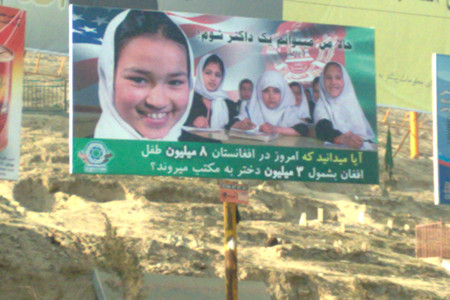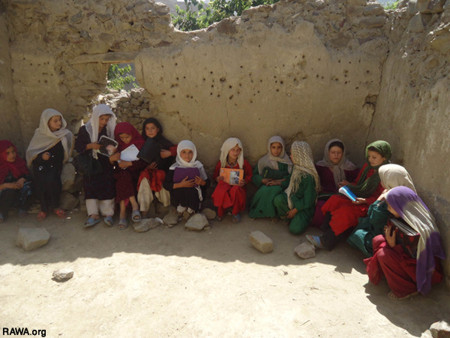By Mohammad Hassan Hakimi
Hayatollah is supposed to be teaching history and geography for grades six to nine at the Kahrezak Secondary School, located 60 kilometres from Chaghcharan, the provincial centre of Ghor province in central Afghanistan.
But when asked to identify Ahmad Shah Durrani, the first king of Afghanistan, the 22-year-old teacher replied with a smile that he did not know who he was. Asked to name the most famous rivers in Afghanistan, he said he did not know the name of any of them except the river Ghor.
Hayatollah said he was sent to Kahrezak two years ago by the provincial education department, but found out early on that the other teachers at the school did not possess even basic literacy skills.
He went back to Chaghcharan and never returned to the school. Even so, he has been receiving his monthly salary for the past two years.
“The cashier brings my salary to my door every month,” he said.
An investigation by the Institute for War and Peace Reporting indicates that at least 280 million afghanis, approximately 5.8 million US dollars, from the education ministry’s budget for Ghor province has been spent to little effect, and in some cases handed over to local power-brokers.
Only 20 per cent of the provincial education budget goes to staff who turn up and teach in the schools. The rest is either paid to absentee teachers, or appropriated in their name by education and law-enforcement personnel. To date, no government agency has looked into reports of embezzlement of this kind.
An IWPR survey indicates that of the 4,000 teachers currently on the payroll in Ghor, perhaps 3,200 have no qualifications – some cannot read and write.
IWPR compiled a list showing that 80 per cent of the 740 schools in the province are not operating at all, even though the education department still pays salaries to the teachers.
As a result of this situation, pupils are promoted from one class to the next, year after year, without learning a thing, according to both government officials and teachers who admit they have not set foot in a classroom for many months.
MISSING MONEY
The Afghan government is aware of the problem of absentee teachers being paid. A report by the Pajhwok news agency from October 2010, quoted Mohammad Safdar Khodayar, a member of the auditing team for Ghor’s education department, as saying 90 per cent of schools in Chaghcharan were closed yet teachers were being paid on a monthly basis. He described the practice as a betrayal of the nation and blamed it on corruption within the provincial education department.
Documents and other evidence obtained during IWPR’s investigation suggest that education officials continue to be implicated.

RAWA: A billboard at a busy Kabul roadside read: "Do you know? Today 8 million children in Afghanistan attend school, including 3 million girls." Such propaganda is common on televisions and billboards but security reasons preventing girls from attending schools and the low-quality of education is completely ignored and deceptive statistics are provided to sugar-coat the terrible condition of education in Afghanistan. (Photo: RAWA.org)
Ahmad Tawab, director of education in Ghor province, was arrested last October. National Directorate of Security, NDS, officers detained him in his office moments after he received 200,000 afghanis, about 4,100, from Sherzai, director of the UNESCO office in Ghor. Tawab is currently in detention.
Tawab has asked Sherzai for the money to pay three month’s salary to 100 teachers running a UNESCO literacy course, according to court document. The education director told the UNESCO official he would not sign salary forms for the teachers unless he got the 200,000 afghanis.
In another case, in July 2010, Mohammad Nayim Forugh, then head of the provincial education department, was charged with stealing 500 sacks of wheat which the World Food Programme had made available for school pupils in Chaghcharan. Forugh had sold some of the 100-kilogram sacks when the authorities discovered the theft.
Forugh left Ghor for Kabul, but was arrested en route by NDS officials. He confessed, and a court in Ghor sentenced him to five years, upheld at an appeals hearing in October 2010.
After an investigation by Ghor education department’s audit office, the deputy heads of the provincial education and administrative departments, Id Gol Azem and Kamaloddin Maududi, were dismissed amid accusations that they had embezzled 400,000 afghanis from the education budget. The two men quickly repaid the money.
Bribery and embezzlement is not limited to the education system Ghor. IWPR’s investigation found that officials in Kabul are also implicated in corrupt practices.
In October 2010, an IWPR reporter was conducting private business in the Chaghcharan branch of the Kabul Bank when he spotted Habiborahman Hakimi, an employee of the Ghor municipal properties department, with a large bundle of 1,000 afghani notes in his hands.
When the reporter questioned him, Hakimi admitted he had come to the bank to deposit 400,000 afghanis in the account of a friend from Mazar-e-Sharif, who happened to be part of an anti-corruption commission delegation from Kabul that had recently arrived in Ghor.
Hakimi told the reporter the mayor of Ghor had asked him to place the money secretly in a specific bank account. He said the money was the mayor’s own and that the auditors from Kabul had asked him for it as a bribe, promising in return that the mission’s investigation would not make any trouble.
Hakimi also said that three days earlier, he had been handed 500,000 afghanis by the director of education in Ghor, and deposited it in the bank account of a relative of one of the committee members.
A two-year investigation conducted by the Afghanistan’s High Office of Oversight and Anti-Corruption uncovered three methods by which education officials collected the salaries of school staff who did not go to work.
Mohammad Ibrahim Khalil, director of monitoring for the Afghan education ministry, gave an IWPR reporter documents and other evidence showing that the wages of 400 night guards who had not gone to work were embezzled.
Khalil said two or three guards are assigned to each school, and education officials prepared a fake organisational chart for 400 staff in schools across nine districts. This allowed them to collect 3,500 afghanis per month for each of these positions, amounting to a total monthly haul of 1.4 million afghanis.
Khalil said this money went into the pockets of education chief Ahmad Tawab, provincial administrative and finance officials, accountants and military and police commanders in rural areas.
In a second form of corruption, Khalil said, the education department signed one-year contracts with 1,900 teachers, who did not actually go to work. The following year, 1,900 different teachers were signed up in their place, and education staff took one month’s salary from each in return.
Khalil showed IWPR documents indicating some of this money went to Ahmad Tawab and others including education department accountants. The rest of the money allegedly went to the Ghor finance department and to some local commanders.
According to Khalil, the third corrupt practice includes teachers who get paid although they do not go to work. In return, they hand over a small percentage of their salary to local government staff when they collect it every month. Khalil says this money, too, goes to education and financial department personnel and local commanders.
Khalil described how he personally witnessed in his a teacher who had not been seen for months asking for 18,000 afghanis in back pay. The accountant asked the teacher for a 9,000-afghani cut of the payment. Khalil said he urged the accountant not to take the bribe, but he ignored him, took the money and used some of it to buy mobile phone cash cards which he gave to another accountant in the office.
ABSENCE OF OVERSIGHT
Khalil blames poor communication between the education ministry in Kabul and its department in Ghor for allowing the latter to operate without transparency and control. He said he had sent more than 200 official letters to the Ghor education department complaining about defunct schools and absentee teachers. IWPR has copies of 62 of these letters.
“I’m sure all those letters have been used to light the stove in the education minister’s office in winter,” he joked.
Khalil noted that his efforts did lead to the sacking of ten teachers from schools who were still being paid despite being absent for five months. But 20 days after they lost their jobs, education director Ahmad Tawab reappointed five of them.
The local government chief in Ghor’s Pasaband district, Mohammad Nasim Kohzad, said all 52 schools in the district were closed. He said he had made unsuccessful appeals to Ghor officials and Afghan education minister Ghulam Faruq Wardak to get them reopened.
“I have complained several times to the governor and the education director that mullahs and Taleban who carry guns on their shoulders are getting receiving salaries in the name of teachers, but no one cares,” Kohzad said.
The chairman of Ghor provincial council, Fazl Haq Ihsan, said it was regrettable that teachers’ salaries were handed out “like charity.” He said he had complained to the provincial governor and education chief, to no effect.
Local government officials responsible for wage allocations in Ghor say it is not their job to track how the money is distributed.
Mohammad Yusuf Maslak Fahm, head of the provincial finance department, said his office disbursed about 350 million afghanis to 4,000 teachers annually. Payment was contingent on a teacher’s name being listed on Form M41, which shows of salaries confirmed by the education department and the relevant district government chief.
“We are responsible for paying teachers’ salaries,” he said. “We are not responsible for asking whether those teachers are present or absent.”
“NO TEACHERS, NO PUPILS”
When IWPR interviewed Ghor education chief Ahmad Tawab before he was arrested in October 2011, he admitted the education department had serious problems, but said in his own defence that he was from Uruzgan province and was unfamiliar with Ghor, although he had been in post since 2002. He admitted that he had very little oversight of what went on in the schools.
Tawab agreed that many teachers were local mullahs who had ties to the Taleban. He acknowledged that many did not turn up for work, but appeared on the payroll after paying bribes.
Local government officials in Ghor accept that most of the 740 schools there are closed and that 280 million afghanis in teaching wages are being distributed illegally every month.
“There are no teachers, no students, no books, no education and no study in these schools,” Khatibi, spokesman for Ghor’s governor, said.
Khatibi said the governor was aware of massive corruption, bribery and embezzlement in the education department.
“When a teacher is appointed, it isn’t important to the education department whether he is literate; what is important is that he should come from a specific ethnic group or village,” he added.
Gholam Rabbani Hadafmand, an inspector with the teacher training department in Ghor, said he was asked last year to assess the educational level of staff in the Shahrak, Saghar and Du Layna districts. Of the 300 teachers he interviewed, more than 200 were completely illiterate.
As Khatibi put it, “Schools in Ghor are plentiful in quantity but not quality.”
Mohammad Hassan Hakimi is an IWPR-trained reporter in Afghanistan.
This report was produced in November 2011 as part of the Afghan Investigative Journalism Fund project, and originally published on the Afghan Centre for Investigative Journalism website which IWPR has set up locally.




